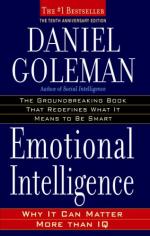
|
| Name: _________________________ | Period: ___________________ |
This quiz consists of 5 multiple choice and 5 short answer questions through Chapter 9.
Multiple Choice Questions
1. During an emotional hijacking, emotions interfere with what, also known as the ability to take in and process information?
(a) Working memory.
(b) Intelligence Quotient.
(c) Somatic markers.
(d) Verbal development.
2. According to the author in “Part Three: Chapter 9, “Intimate Enemies,” boys honor independence while girls treasure what?
(a) Connectedness.
(b) Survival.
(c) Confidence.
(d) Rationality.
3. John Mayer names three styles of handling one’s emotions. What is the third?
(a) The justified.
(b) The accepting.
(c) The engulfed.
(d) The self-aware.
4. What name refers to the groups of nuclei in the limbic system which store emotional memory assigning meaning to feelings?
(a) The amygdala.
(b) The neocortex.
(c) The olfactory lobe.
(d) The brainstem.
5. Walter Mischel works as a psychologist at what university?
(a) Columbia University.
(b) Pennsylvania State University.
(c) The University of Wisconsin.
(d) New York University.
Short Answer Questions
1. Marriages that began in 1890 suffered a divorce rate of what percentage, according to the author in Part Three: Chapter 9, “Intimate Enemies”?
2. Who found that husbands find disagreements more stressful and therefore have a lower threshold for flooding leading them to stonewall as a protective defense?
3. Charisma combines four separate interpersonal intelligence components. What is the fourth?
4. An example of the social skills of charisma is exemplified by a scenario with an elderly Japanese man calming who on a bus in Part Two: Chapter 8, “The Social Arts”?
5. According to an example in “Part Three: Chapter 9, “Intimate Enemies,” when boys play a sports game and one gets injured, the injured is expected to do what?
|
This section contains 279 words (approx. 1 page at 300 words per page) |

|




